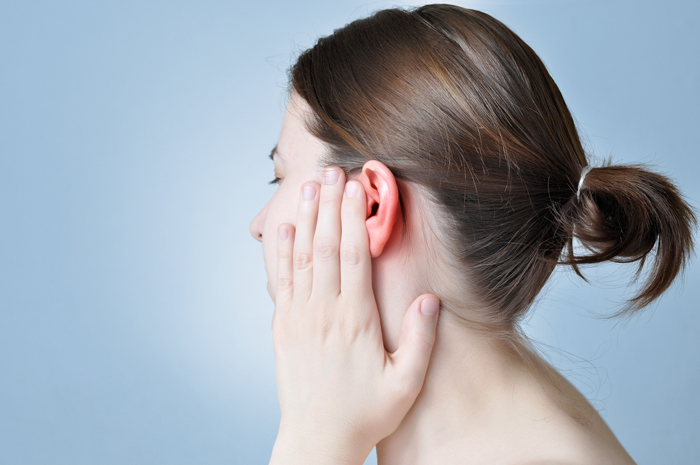Chronic Ear Infection Treatment & Diagnostics in Karol Bagh, Delhi
Chronic Ear Infection
Chronic ear infection refers to recurring bouts of acute otitis media which refuse to heal. The eustachian tube responsible for draining fluid from the middle ear can become clogged, leading to an infection with fluid build-up and pain.
Children having smaller eustachian tubes are more prone to developing this condition. Unlike acute otitis media, chronic ear infection does not subside on its own and needs expert treatment. Consult an ENT specialist near you for management and follow-up. You can also visit an ENT hospital near you.

What is chronic ear disease?
The air-filled space just behind the eardrum is generally referred to as the middle ear. This part contains the smaller bones – the malleus, incus and stapes – covered by the eardrum (tympanic membrane). These bones are responsible for sound vibrations. Sound is thus passed to the inner ear, wherein nerve impulses for hearing are created, and the signal is sent to the brain. The eustachian tube connects the middle ear to the back of the nose and throat and controls the air flow and pressure inside the middle ear.
Infection develops in the middle ear when a person catches cold or any allergy (upper respiratory tract infection). This blocks the eustachian tube, thus retaining fluid in the middle ear. This condition is called chronic serous otitis media.
What are the symptoms of chronic ear disease?
Symptoms of a chronic ear infection include:
- Constant feeling of pressure in the ear
- Persistent pain in the ear, albeit mild
- Drainage from ears
- Mild fever
- Loss of hearing due to accumulated fluids
- Sleeping issues due to constant discomfort
- Change in appetite for babies
- Babies pulling their ears constantly
What causes chronic ear disease?
- Primary infections like cold, flu, allergies
- Fluid deposition and accumulation in eustachian tube
- Children more prone to developing secondary ear infection
- Genetic factors may also contribute to development of such conditions
When do you need to see a doctor?
Any persistent symptom of an ear infection needs medical attention. Especially,
- Acute ear infection not responding to first line of treatment recommended by a doctor
- Worsening of symptoms
- Recurring infections in the ear
Request an appointment at Apollo Spectra Hospitals, Karol Bagh, New Delhi.
Call 1860 500 2244 to book an appointment.
What are the complications?
A chronic ear infection can cause several problems if left untreated. Possible complications include:
- Hearing loss
- Perforation of the eardrum
- Damage to the bones of the ear
- Tympanosclerosis – scarring and hardening of ear tissue
- Cholesteatoma – a type of cyst formed in the middle ear
- Spread of the infection to the meninges of the brain
- Facial paralysis in the most severe cases
How is chronic ear disease treated?
- Medication includes topical antibiotic ear drops and over-the-counter pain relief medication; please do not self-medicate, especially with regard to young children.
- Surgical intervention may range from inserting ear-tubes through the eardrum to drain the fluids from the inner ear to surgical repair/replacement of damaged bones. One such surgical procedure is called mastoidectomy.
Conclusion
Chronic ear infection needs the expert opinion of an ENT specialist. It can present with mild but persistent symptoms and can cause more damage if not taken care of appropriately.
Chronic ear infection is called so because of its persistent nature. Appropriate medication can be useful in treating and managing the infection better. It depends on the severity and the doctor’s viewpoint.
Any form of pain, however mild it is, deserves an expert consultation from a doctor. Please do not hesitate visiting an ENT specialist near you, if you have persistent symptoms, however minor they may seem.
It is a possibility, but a very distant one. Unless and until it is a very severe form of a bacteria causing the primary infection, the changes of meningeal penetration are rare.
Consuming unnecessary antibiotics beyond what a doctor recommends might cause antibiotic resistance and make the infection last longer. Hence, please do not self-medicate, especially with regard to antibiotics.
Symptoms
Our Doctors
DR. AMEET KISHORE
MBBS, FRCS - ENT(Gla...
| Experience | : | 25 Yeras Experience |
|---|---|---|
| Speciality | : | ENT, Head and Neck S... | Location | : | Chirag Enclave |
| Timings | : | Thur : 9:00 AM to 10... |
DR. ASHWANI KUMAR
DNB, MBBS...
| Experience | : | 9 Yeras Experience |
|---|---|---|
| Speciality | : | ENT, Head and Neck S... | Location | : | Chirag Enclave |
| Timings | : | Thur : 9:00 AM to 10... |
DR. MANISH GUPTA
MBBS, MS (ENT)...
| Experience | : | 23 Yeras Experience |
|---|---|---|
| Speciality | : | ENT, Head and Neck S... | Location | : | Chirag Enclave |
| Timings | : | Mon, Wed: 12:00 PM t... |
DR. R K TRIVEDI
MBBS, DLO, MS (ENT)...
| Experience | : | 44 Yeras Experience |
|---|---|---|
| Speciality | : | ENT, Head and Neck S... | Location | : | Karol Bagh |
| Timings | : | Wed, Fri : 12:00 PM ... |
DR. RAJEEV NANGIA
MBBS, MS (ENT)...
| Experience | : | 29 Yeras Experience |
|---|---|---|
| Speciality | : | ENT, Head and Neck S... | Location | : | Karol Bagh |
| Timings | : | Tue, Sat : 12:00 PM ... |
DR. SANJIV DANG
MBBS, MS (ENT)...
| Experience | : | 34 Yeras Experience |
|---|---|---|
| Speciality | : | ENT, Head and Neck S... | Location | : | Karol Bagh |
| Timings | : | Mon - Sat : 9:00 AM ... |
DR. S C KAKKAR
MBBS, MS (ENT), DLO,...
| Experience | : | 34 Yeras Experience |
|---|---|---|
| Speciality | : | ENT, Head and Neck S... | Location | : | Karol Bagh |
| Timings | : | Available by prior a... |
DR. NISHI GUPTA
MBBS, MS - ENT, DNB ...
| Experience | : | 26 Yeras Experience |
|---|---|---|
| Speciality | : | ENT, Head and Neck S... | Location | : | Karol Bagh |
| Timings | : | Mon, Tues, Thurs, Fr... |
DR. SORABH GARG
MBBS, DNB (Anaesthes...
| Experience | : | 16 Yeras Experience |
|---|---|---|
| Speciality | : | Pain Management... | Location | : | Karol Bagh |
| Timings | : | Mon - Sat : 9:00 AM ... |
DR. CHANCHAL PAL
MBBS, MS (ENT)...
| Experience | : | 40 Yeras Experience |
|---|---|---|
| Speciality | : | ENT, Head and Neck S... | Location | : | Chirag Enclave |
| Timings | : | Thur, Fri : 11:00 AM... |
DR. LALIT MOHAN PARASHAR
MS (ENT)...
| Experience | : | 30 Yeras Experience |
|---|---|---|
| Speciality | : | ENT, Head and Neck S... | Location | : | Chirag Enclave |
| Timings | : | Mon, Wed, Fri - 9:00... |
DR. SANJAY GUDWANI
MBBS, MS (ENT)...
| Experience | : | 31 Yeras Experience |
|---|---|---|
| Speciality | : | ENT, Head and Neck S... | Location | : | Chirag Enclave |
| Timings | : | Tue, Fri : 5:00 PM t... |
DR. SWARAJ MISHRA
MBBS - JLN Medical C...
| Experience | : | 28 Yeras Experience |
|---|---|---|
| Speciality | : | ENT, Head and Neck S... | Location | : | Chirag Enclave |
| Timings | : | Mon, Wed, Thur & Sat... |
DR. NAYEEM AHMAD SIDDIQUI
MBBS, DLO-MS, DNB...
| Experience | : | 14 Yeras Experience |
|---|---|---|
| Speciality | : | ENT, Head and Neck S... | Location | : | Chirag Enclave |
| Timings | : | Mon - Sat : 11:00 AM... |
DR. SALONI SINHA
MBBS, MS Surgery...
| Experience | : | 7 Yeras Experience |
|---|---|---|
| Speciality | : | ENT, Head and Neck S... | Location | : | Karol Bagh |
| Timings | : | Thur : 12:00 PM to 2... |
DR. PALLAVI GARG
MBBS, MD (General Me...
| Experience | : | 17 Yeras Experience |
|---|---|---|
| Speciality | : | General Surgery & Ga... | Location | : | Karol Bagh |
| Timings | : | Mon - Fri : On Call... |
DR. VENKATA RAMESH
MBBS, MS (ENT), DNB...
| Experience | : | 34 Yeras Experience |
|---|---|---|
| Speciality | : | ENT... | Location | : | Chirag Enclave |
| Timings | : | Mon, Wed, Thur, Fri ... |
DR. NITYA SUBRAMANIAN
MBBS, DLO, DNB (ENT)...
| Experience | : | 17 Yeras Experience |
|---|---|---|
| Speciality | : | ENT, Head and Neck S... | Location | : | Karol Bagh |
| Timings | : | Mon & Thur : 11:00 A... |
Our Top Specialities
NOTICE BOARD
CONTACT US
CONTACT US
 Book Appointment
Book Appointment




















.svg)
.svg)
.svg)
.svg)








